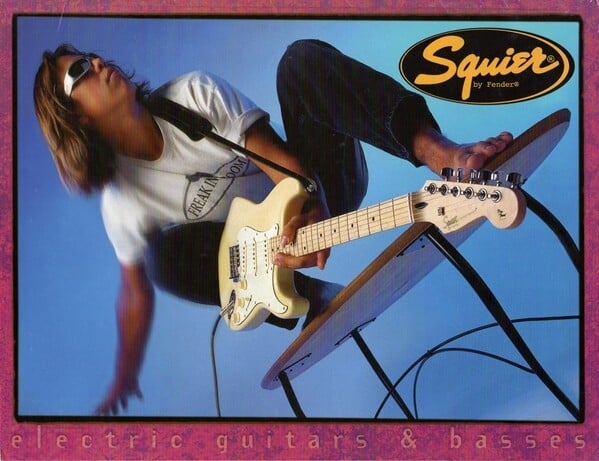The Squier Pro Tone: the revenge of the made in Korea


|
Squier had been useful to Fender in competing with Eastern copy guitars, but in the early-90s its purpose had become unclear, and it looked close to collapse because its competitors now were attacking the Squier brand by offering more features, better woods, and more colors and finishes at the same price points where Squier lived.
Korean Squiers were turning out to be a big failure because their plywood-body guitars were subject to severe negative marketing, and Squier was slowly losing market share to its competitors. Fender had to ratchet up the quality of the Squier brand, so they decided to introduce new “deluxe” Squier models to complement the cheaper Squier Standard series already in the catalog, the Pro Tone Series. |
|
According to John Carducci, they made this change because the Squier logo should have been a “badge of honor, instead of implying that it was the badge of dishonor. It was all done to help Squier stand on its own, to give it its own identity”.
The original idea was to remove the words “By Fender” from the headstock, but they prefer to leave it next to the Squier decal, not so much to add credibility to Squier, but for trademark protection. |
|
The beautiful solid ash body of Pro Tone Stratocasters was available in the stunning “see-through” finishes Vintage Blonde, Trans Crimson Red, 3-Tone Sunburst, Trans Sapphire Blue (sometimes turned to green over time), and Trans Green, plus Olympic White for the SSS model and Black for the fat model, both with matching headstock. Furthermore, Crimson Red, Sapphire Blue, and Black Pro Tone Strats had all gold hardware.
Appreciated upgrades were the Precision Die-Cast tuning machines and the alnico-loaded single-coil pickups with staggered pole pieces - previous Korean Squiers featured rather sharp-sounding ceramic pickups - that delivered an authentic woody twang with plenty of clear-toned attack on top. The bridge humbucker of the fat model darkened things down a fair bit, but increased output and sustain. The 21-fret fingerboard radius on Pro Tone Stratocaster was 9.5” - just like Fender USA - while the Pro Tone Fat Strat featured a contemporary 12” radius for choke-free bending and 22 frets. |

|
© COPYRIGHT 2014-2024 FUZZFACED.NET BY ANTONIO CALVOSA - TUTTI I DIRITTI RISERVATI
La copia, la riproduzione, la pubblicazione e la redistribuzione dei contenuti, se non autorizzate espressamente dall'autore, sono vietate in qualsiasi modo o forma. |

|
© COPYRIGHT 2014-2024 FUZZFACED.NET BY ANTONIO CALVOSA - ALL RIGHTS RESERVED
The copying, reproduction, publication and redistribution of the contents, unless expressly authorized by the author, are prohibited in any way or form. |